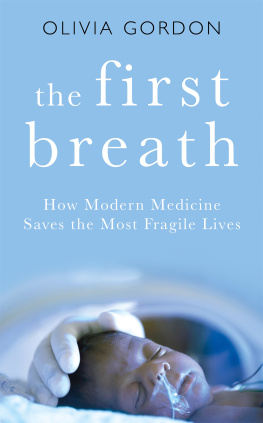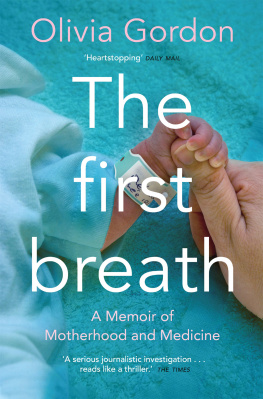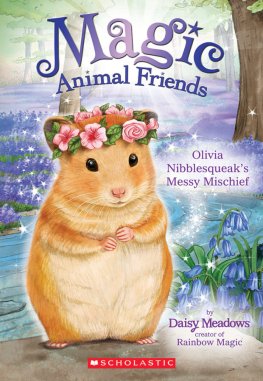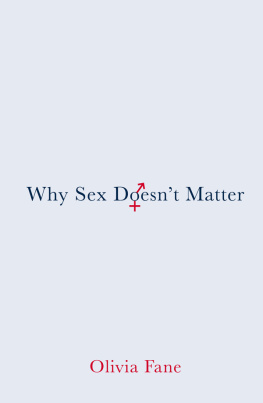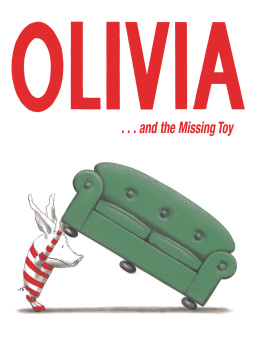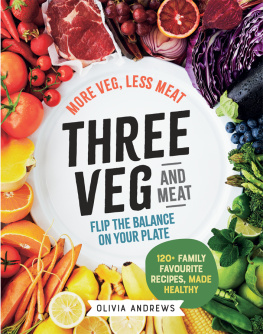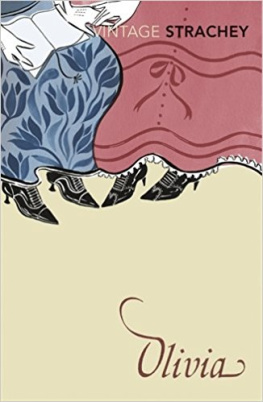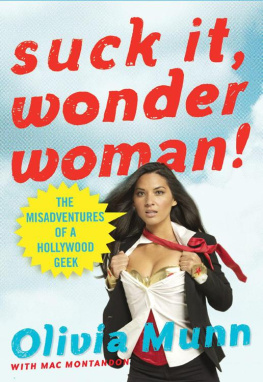Olivia Gordon - The First Breath
Here you can read online Olivia Gordon - The First Breath full text of the book (entire story) in english for free. Download pdf and epub, get meaning, cover and reviews about this ebook. publisher: Pan Macmillan UK, genre: Non-fiction. Description of the work, (preface) as well as reviews are available. Best literature library LitArk.com created for fans of good reading and offers a wide selection of genres:
Romance novel
Science fiction
Adventure
Detective
Science
History
Home and family
Prose
Art
Politics
Computer
Non-fiction
Religion
Business
Children
Humor
Choose a favorite category and find really read worthwhile books. Enjoy immersion in the world of imagination, feel the emotions of the characters or learn something new for yourself, make an fascinating discovery.
- Book:The First Breath
- Author:
- Publisher:Pan Macmillan UK
- Genre:
- Rating:4 / 5
- Favourites:Add to favourites
- Your mark:
- 80
- 1
- 2
- 3
- 4
- 5
The First Breath: summary, description and annotation
We offer to read an annotation, description, summary or preface (depends on what the author of the book "The First Breath" wrote himself). If you haven't found the necessary information about the book — write in the comments, we will try to find it.
The First Breath — read online for free the complete book (whole text) full work
Below is the text of the book, divided by pages. System saving the place of the last page read, allows you to conveniently read the book "The First Breath" online for free, without having to search again every time where you left off. Put a bookmark, and you can go to the page where you finished reading at any time.
Font size:
Interval:
Bookmark:


For Joel. I love you infinitely and forever.
And for Lyndall and Siamon Gordon.
When I felt low, my parents were the ones I turned to first, and they were with me whenever I needed any kind of help. I only really understood once I had my own child what extraordinary parents I have. Their love has always been unconditional, as is mine for them.
Some childrens and parents names, and sometimes identifying details, have been changed to protect privacy, and also to allow people to speak freely.
Some parts of this book were originally published in earlier forms (in the Guardian , The Times , the Telegraph , Nursing Standard , the Daily Mail , the Huffington Post and Red ), and their reuse is gratefully acknowledged.
Until twenty years ago, children this medically complex didnt exist. They didnt survive. High-tech medicine has created a new strain of human beings who require superhuman care. Society has yet to acknowledge this reality, especially at a practical level.
IAN BROWN, THE BOY IN THE MOON BROWN, 2009
This is a story about love and fear: the love and fear a parent feels for a child who is still unknown; the love and fear doctors and nurses feel but dont show when they try to save that childs life. Its a story of bravery: the bravery of pioneering doctors and nurses who have to risk a childs death to give life; the bravery of a mother and baby who have no other choice and who believe they are anything but brave.
This is a story of living through medical history, a history so recent it happened within my own generations lifetime. New fields of medicine built in the last decades of the twentieth century and the dawn of the twenty-first have saved a generation of children who would not have survived before, whose first breaths come only thanks to teams of fetal medics and neonatologists. This medicine has also created a new generation of parents who raise these survivor children.
Almost all the parents I interviewed for this book are people I have met in the course of my life as a mother of a child with a difference, a special child. If youre not a member of this group, you might not realize how many of us there are these days. Our children dont always have noticeable disabilities, but, at a very young age, they have been through more challenges than many people face in a lifetime. They may be growing up with rare genetic conditions, or may be survivors of fetal surgery, prematurity or congenital organ defects. They may (or may not) have subtle neuropsychiatric differences autistic spectrum, attention-deficit, sensory processing and/or dyspraxic traits and developmental delays. What they have in common is that they are part of a new group of people whose lives began with an unprecedented level of medical intervention. In many cases they have diagnoses which were impossible to pinpoint until recent years.
As a mother of one such child, without even trying to find others, I meet them everywhere I go. Until the late twentieth century, even when they survived infancy, children growing up with disabilities were often hidden in institutions, educated entirely outside the mainstream, or otherwise excluded from society. Today its a different story, so I didnt have to search for parents to talk with.
I found myself the mother of a baby whose life was saved by cutting-edge medicine and this book tells my story, and those of other mothers. Modern science is affecting mothers in the most profound way and I believe its time to pay more attention to the female experience of medicine. Fathers experiences are of course just as important as mothers, but this is a book primarily about what its like to become a mother when pregnancy doesnt go to plan. What its like to be one of the young people of this new generation is yet another story in itself. As is what its like to have a sick baby without access to the medical privileges of the first world. There are so many stories to tell.
I had an impressionistic, emotional and highly personal understanding of what happened in my own story of motherhood. But I became fascinated by the science and medicine that had touched my familys life so deeply from histories to principles to practice and wanted to learn more. I decided to turn my journalists eye on my own experiences; in effect, to investigate my own case history. What if a patient tried to understand her doctors? Turning from vulnerable patients mother to writer and reporter would involve a change of relationship with all-powerful doctors, perhaps.
A journalists job is to investigate and report to learn from experts. I am a writer who loves science, and I am the mother of a child with a medical condition, not a scientist. My research for this book scratches the surface of multiple complex medical fields. I could spend a lifetime digging just a little deeper and still know next to nothing: the more one knows, the more one realizes how little one knows. I apologize for my ignorance and am immensely grateful to those doctors and scientists who shared their expertise with me. Any mistakes are my own.
Abnormality
Every bump is a mystery
PROFESSOR ANNA DAVID, FETAL MEDICINE CONSULTANT
One muggy August day in 2015, I sat in a large treatment room at the end of a corridor in central London, watching as consultant obstetrician George Attilakos placed a knife in a kidney dish on a small wheeled table. Together with midwives Ignacio Rosas and Georgina Fox, he laid out everything he needed for the invasive procedure he was about to perform on a woman seventeen weeks pregnant with twins: gauze, syringes, needles, large sterile dressings and plastic and metal tubes. The floor around the bed was covered in paper towels.
At three oclock, the patient walked in, wearing a hospital gown. Emma was twenty-eight, and, in the world outside, a cheerful, robust office manager and mother of a toddler.
The surgery she was here to have fetoscopic laser treatment, burning the blood vessels in her placenta to disconnect her twins, who had developed twin-to-twin transfusion syndrome is one of the more intense procedures the fetal medicine unit of University College Hospital (UCH) undertakes, and is not done lightly.
Emma and her partner Tom, a taxi driver, from north London, had had a complicated pregnancy. At four months, a scan revealed one twin had acrania the baby was developing without a skull and wouldnt survive after it was born. Emma and Tom were sent here, one of Britains leading fetal medicine centres, which treat the most problematic pregnancies. Then, on this overcast day, the doctors told them there was a time bomb in Emmas womb.
Blood vessels in the twins shared placenta were giving one baby too much blood and the other too little, which meant the twin without acrania was likely to die, too. Laser treatment has many risks but gave an 80 per cent chance that the well baby would survive there was simply no other option. Doctors treat forty cases of twin-to-twin transfusion syndrome each year here, one of only a few hospitals in Britain to do this.
Emma lay on the bed with an absorbent towel tucked into her pants. Naturally a chatty, confident person, she was breathing deeply: Im really nervous. She was draped from neck to toe, only her belly exposed. The doctor and midwives tried to be reassuring Most women afterwards say its not as bad as they think, said Mr Attilakos, gowning up but Emma radiated anxiety as she was handed a pair of dark glasses to protect her eyes from laser rays. She moaned and sang to herself. Then she sighed: I dont want to see anything, and squeezed her eyes shut.
Font size:
Interval:
Bookmark:
Similar books «The First Breath»
Look at similar books to The First Breath. We have selected literature similar in name and meaning in the hope of providing readers with more options to find new, interesting, not yet read works.
Discussion, reviews of the book The First Breath and just readers' own opinions. Leave your comments, write what you think about the work, its meaning or the main characters. Specify what exactly you liked and what you didn't like, and why you think so.

